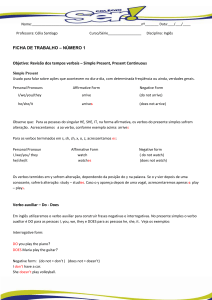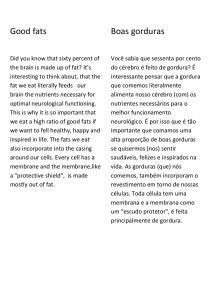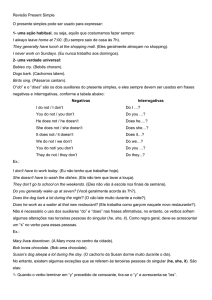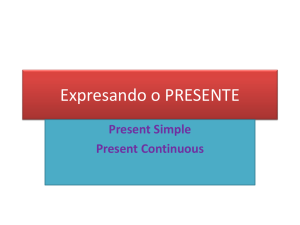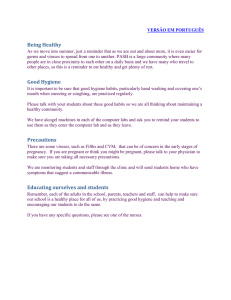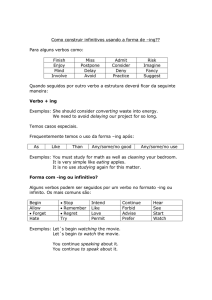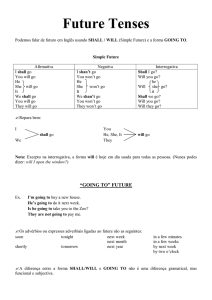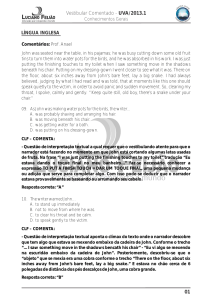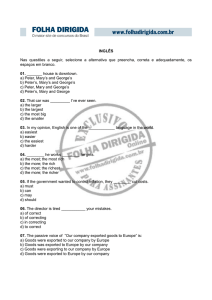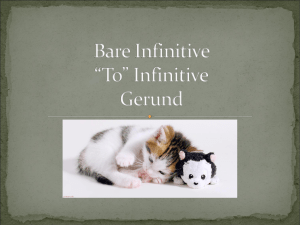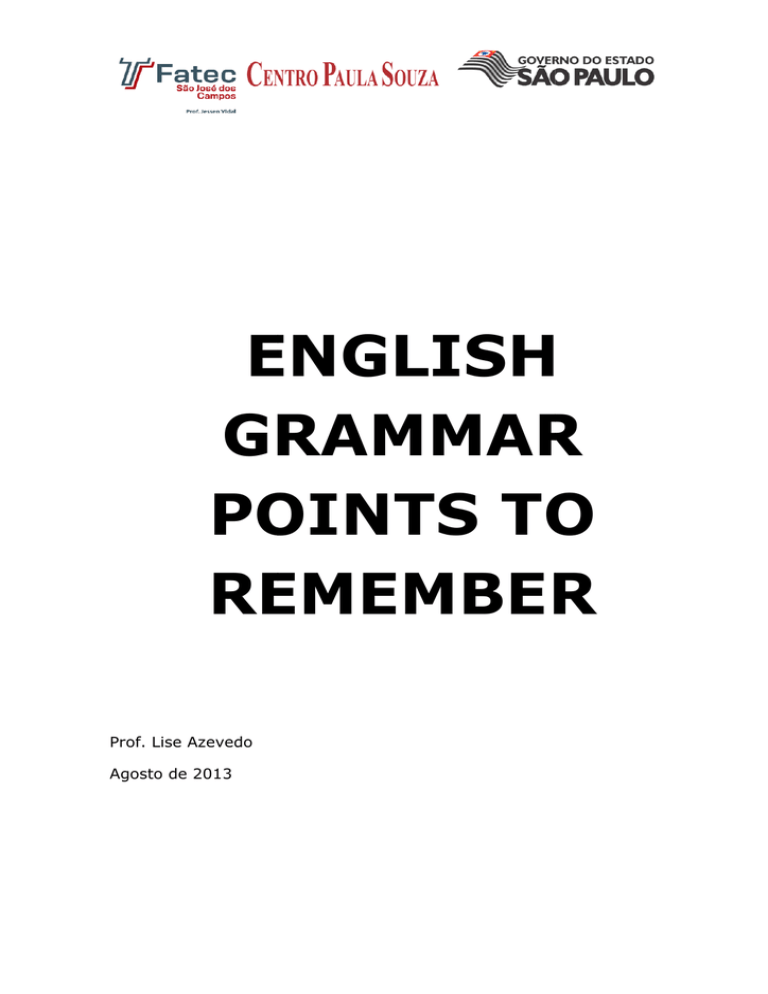
ENGLISH
GRAMMAR
POINTS TO
REMEMBER
Prof. Lise Azevedo
Agosto de 2013
Prezado aluno,
Este material tem como objetivo ajudá-lo, de forma prática, na compreensão e uso da
gramática da Língua Inglesa. É o nosso primeiro material específico de gramática que
abrange tópicos relevantes até o nível B1 (Intermediário) estipulado pelo ‘Common
European Framework’. Este é o nível que se espera que você atinja ao completar os seis
semestres de aprendizado de Língua Inglesa. Todos os assuntos aqui abordados estão
apresentados de forma resumida, com exemplos e dicas para facilitar o seu
entendimento. Estão sendo abordados apenas aspectos morfológicos da língua assim
como acontece no estudo da morfologia de Língua Portuguesa.
Index:
1. Article: Definite, Indefinite articles.
2. Pronoun: Personal Pronouns, Possessive Adjectives and Possessive Pronouns,
Reflexive Pronouns, Demonstrative Pronouns/Adjectives, Indefinite Pronouns and
Adjectives/ Quantifiers, Relative Pronouns, Interrogative Pronouns.
3. Noun: Concrete Nouns, Abstract Nouns, Gender of Nouns, Plural of Nouns,
Uncountable Nouns.
4. Verb and Tense: Simple Tenses, Continuous/Progressive Tenses, Perfect Tenses,
Modal Verbs, Gerund and Infinitive, Active and Passive Voice, Conditional If Clause.
5. Adjective: Position of adjectives, Degrees of Comparison.
6. Adverb: Manner, Frequency, Time, Place, Degree/Intensity, Doubt/Certainty, Degrees
of Comparison.
7. Preposition: Place, Time, Movement.
8. Number: Cardinal, Ordinal
Mathematical Expression.
Numbers,
Roman
Numbers,
Fraction,
Percentage,
Bibliografia utilizada:
AMOS, Eduardo; PRESCHER, Elizabeth. The Richmond Simplified Grammar Book of
English. Richmond Publishing. São Paulo: Moderna, 2008.
AMOS, Eduardo; PRESCHER, Elizabeth; PASQUALIN. Challenge. Richmond Publishing.
São Paulo: Moderna, 2008.
www.solinguainglesa.com.br
1
1. ARTICLE: (artigo) É a classe de palavras que se antepõe ao substantivo para definir,
limitar ou modificar seu uso e dividem-se em Definido e Indefinido.
a) Definite Article: The (o, a, os as)
É usado antes de um substantivo (singular ou plural). É invariável em gênero e número.
The boy - O menino
The girl - A menina
The boys - Os meninos
The girls - As meninas
b) Indefinite Article: A (um, uma); An (um, uma)
É usado antes de um substantivo (singular). É invariável em gênero e número e é usado
antes de palavras que iniciem por som de consoante, ou seja, antes de consoantes, da
semivogal Y e do H sonoro e antes de palavras iniciadas por "EU", "EW" e "U", porque
têm o som de consoante quando aparecem no início de palavras.
A book
A year
A house
A university
AN é utilizado antes de palavras que iniciem por som de vogal, ou seja, antes de vogais
e de H mudo.
An egg
An arm (um braço)
An hour
An honest man
2. PRONOUN: (pronome) É a classe de palavras que acompanha ou substitui um
substantivo ou um outro pronome. Os pronomes nos ajudam a evitar repetições
desnecessárias na fala e na escrita. E se dividem em:
a) Personal Pronouns:
Caso Reto (Sujeito) Subject
Caso Oblíquo (Objeto)
Pronoun
Object Pronoun
I (eu)
me (me, mim)
you (tu, você)
you (lhe, o, a, te, ti, a você)
he (ele)
him (lhe, o, a ele)
she (ela)
her (lhe, a, a ela)
it (ele, ela [neutro])
it (lhe, o, a)
we (nós)
us (nos)
you (vocês, vós)
you (vos, lhes, a vocês)
they (eles, elas)
them (lhes, os, as)
Lembrando que o Pronome Pessoal do caso reto funciona como sujeito da oração e, o
Pronome Pessoal do caso oblíquo, funciona como objeto direto ou objeto indireto da
oração.
2
You are a doctor.
Alice and Paul are friends, but Paul loves her.
You are doctors.
He gave me some flowers.
Em Inglês não existe ‘oração sem sujeito’; é necessário usar um pronome que tenha a
função de sujeito:
It started to rain.
It’s easy to learn English.
b) Possessive Adjectives and Possessive Pronouns:
Em Inglês há um adjetivo e um pronome possessivo para cada pronome pessoal.
Possessive Adjectives
Possessive Pronouns
my meu, minha
mine meu, minha
your teu, tua, seu, sua
yours teu, tua, seu, sua
his dele
his dele
her dela
hers dela
its dele, dela (neutro)
its dele, dela (neutro)
our nosso, nossa
ours nosso, nossa
your vosso, vossa, seu, sua, de vocês yours vosso, vossa, seu, sua
their deles, delas (neutro)
theirs deles, delas (neutro)
Lembrando que: O adjetivo possessivo vem antes do substantivo que ele modifica.
O pronome possessivo substitue o substantivo e o adjetivo possessivo.
This is my car and that is yours. (my – adjetivo possessive; yours – pronome
possessive)
c) Reflexive Pronouns: Os Pronomes Reflexivos indicam que a ação reflexiva recai
sobre o próprio sujeito. Nesse caso, o pronome vem logo após o verbo e concorda com o
sujeito.
Personal Pronouns
Reflexive Pronoun
I
myself a mim mesmo, -me
you
yourself a ti, a você mesmo(a), -te,-se
he
himself a si, a ele mesmo, -se
she
herself a si, a ela mesma, -se
it
itself a si mesmo(a), -se
we
ourselves a nós mesmos(as), -nos
3
you
yourselves a vós, a vocês mesmos(as), -vos,-se
they
themselves a si, a eles mesmos, a elas mesmas, -se
Take care of yourself.
Paul cut himself with the knife.
Se antes do pronome reflexivo vier a preposição ‘by’, o pronome reflexivo terá o
significado de sozinho (s), sozinha (s), ‘alone’.
Sometimes I like to be by myself. (alone)
d) Demonstrative Pronouns and Demonstrative Adjectives: Os pronomes
demonstrativos apontam e indicam alguma coisa, lugar, pessoa ou objeto. Eles podem
atuar como adjetivos, antes do substantivo, ou como pronomes substantivos.
1) THIS - ESTE, ESTA, ISTO
This is my pencil. (demonstrative pronoun)
This pencil is red. (demonstrative adjective)
2) THESE - ESTES, ESTAS
These are your copybooks. (demonstrative pronoun)
These copybooks are new. (demonstrative adjective)
3) THAT - AQUELE, AQUELA, AQUILO, ESSE, ESSA, ISSO
That is my house. (demonstrative pronoun)
That house is new. (demonstrative adjective)
4) THOSE - AQUELES, AQUELAS, ESSES, ESSAS
Those are German cars. (demonstrative pronoun)
Those cars are expensive. (demonstrative adjective)
e) Indefinite Pronouns and Adjectives/ Quantifiers (determinantes): podem
ser substantivos (indefinite pronouns), quando os substituem, ou adjetivos (indefinite
adjectives), quando qualificam os substantivos. São usados com substantivos contáveis
(que têm plural) e com os não-contáveis (quando não se pode usar a/an).
1) SOME: ALGUM, ALGO, ALGUNS, ALGUMA, ALGUMAS, UM, UNS, UMA, UMAS, UM
POUCO DE.
Some e seus compostos (somebody, someone, something, somewhere, somehow) são
usados em sentenças afirmativas. Some também pode ser usado em sentenças
interrogativas quando se trata de um oferecimento ou pedido ou quando se espera uma
resposta positiva.
I have some new friends in London.
Would you like some water?
2) ANY: ALGUM, ALGUNS, ALGUMA, ALGUMAS, NENHUM, NENHUMA, UM, UNS, UMA,
UMAS, QUALQUER.
Any e seus compostos (anybody, anyone, anything, anywhere, anyway) são usados em
sentenças interrogativas e negativas.
4
Do you have any money for me?
Sorry, I don’t have any money for you.
Any poderá ser usado na forma afirmativa quando: aparecer após a palavra if;
significar qualquer e houver palavra de sentido negativo na frase como:
seldom, never, rarely, without, etc.
If you have any doubt, please, ask me!
She never has any free time!
3) NO (NONE): NENHUM, NENHUMA
No e seus compostos (nobody, no one, nothing, nowhere) são usados em sentenças
afirmativas com sentido negativo, já que a língua Inglesa não permite dupla negativa em
uma oração.
I have no money = I don’t have any money.
I have nothing to say!
f)Relative
Pronouns:
Os
Pronomes
Relativos
podem
ter
a
função
de sujeito ou objeto do verbo principal. Lembre-se de que quando o pronome relativo for
seguido por um verbo, ele exerce função de sujeito. Caso o pronome relativo for seguido
por um substantivo ou pronome, ele exerce função de objeto.
Pronome
Função de Sujeito – vem
antes de um verbo
The boy who/that arrived
is my son.
Função de Objeto – vem antes de
um substantivo, artigo, pronome, etc.
The girl who/whom/that I saw is
my student.
The cat which/that died
was mine.
The book which/that he bought
was cheap.
cujo(s), cuja(s)
//
Estabelece relação de posse
e vem sempre antes de um
substantivo.
//
The car whose door is broken is
mine.
The woman whose husband died is
my friend.
(pessoa/coisa/animal)
Where
Refere-se a lugar ou lugares
The city where I live is very hot.
Who/whom/that
quem, que (pessoas)
Which/that
qual, quais, que
(coisa/animal)
//
Whose
onde, em que, no qual, na
qual
When
Refere-se a dia(s), mês(s),
ano(s), etc.
quando, em que, no que, no
qual, na qual
What
Pode ter a função de sujeito
Pode ter a função de objeto
o que
They will travel when they buy a
car.
I don’t know what happened to you.
Obs: Em algumas situações o pronome THAT pode substituir os pronomes WHO e
WHICH, como citado na tabela acima. Entretanto, existem situações em que só se pode
usar o pronome THAT:
f.1) quando houver dois antecedentes:
5
I know the singers and the songs that he mentioned.
f.2) após adjetivos no grau superlativo, e após as palavras first e last:
He is the best professor that I know.
The last time that I saw you was in June.
The first thing that you have to do is call a doctor.
f.3) Após all, only, everything, none, some, any, no e seus compostos.
She bought some flowers that we never saw before.
g) Interrogative Pronouns (Question words):
Who (quem) sujeito
Who are you?
Who told you that?
Whom (quem) objeto
To whom were you speaking last night?
Which (qual, quais)
Which purse do you prefer: black or white?
Whose (de quem)
Whose car is this?
What (o que, que)
What do you want to drink?
Where (onde)
Where do you live?
When (quando)
When did you arrive?
Why (por que)
Why do you have to go home now?
3. NOUN: (substantivo) É a classe de palavras que nomeia: pessoas, coisas, lugares,
animais, ideias, ações, qualidades, instituições e fenômenos naturais e dividem-se em
Concretos (podem ser contáveis ou incontáveis) e Abstratos.
a) Concrete Nouns: se subdividem em: Comuns, próprios e Coletivos.
a.1) Common Nouns: designam um ser de uma espécie: house, book, car, dog, chair,
etc.
a.2) Proper Nouns: referem-se a um ser em particular ou a nomes próprios e sempre
iniciam com letra maiúscula: London, The Alps, The United States , Mr. Johnson.
a.3) Collective Nouns: indicam conjunto de pessoas, animais, coisas e conceitos, etc.
People:
audience - of spectators, of listeners, army - of soldiers, staff – of employees
Animals:
army – of ants, flock – of birds, camels, sheep, herd – of pigs, whales, wolves
Things and concepts:
agenda – of tasks, anthology – of poems, collection – of objects
b) Abstract Nouns: Se referem a ideias, sentimentos, estado, ações, qualidades, etc...
Beauty, angry, courage, fear, ability, joy, nature, success, sadness, love
3.1) Gender of nouns:
6
Existem três gêneros em Inglês:
Masculino: boy, man, waiter, brother, groom, father, brother, husband, prince
Feminino: girl, woman, waitress, sister, bride, mother, sister, wife, princess
Neutro: student, doctor, person, lawyer, cook, driver, teacher, guest, translator
A maioria dos substantivos que se referem a pessoas/ profissões são neutros, isto é, têm
a mesma forma para o masculino e para o feminino.
3.2) Plural of nouns:
Como na língua Portuguesa, a maioria dos substantivos faz o plural acrescentando-se a
letra ‘s’ ao singular da palavra:
book – books; car – cars; girl – girls; table – tables; doll - dolls
Entretanto, existem casos especiais:
a) Substantivos que terminam em ch, s, ss, sh, x, z e a maioria dos que terminam
em o:acrescenta-se ‘es’ no final:
church – churches; bus – buses; glass – glasses; crash – crashes; box - boxes
potato – potatoes; tomato – tomatoes; echo – echoes; hero - heroes
obs: Em formas reduzidas e nos vocábulos de origem estrangeira terminados em ‘o’
acresecenta-se apenas ‘s’:
kilo – kilos; photo – photos; radio – rádios; vídeo – vídeos; logo – logos
b) Substantivos que terminam em ‘oo’ acrescenta-se apenas ‘s’ no final:
cuckoo – cuckoos; bamboo – bamboos; zoo - zoos
c) Substantivos que terminam em vogal + ‘y’ acrescenta-se apenas o ‘s’:
boy – boys; guy – guys; day – days; monkey – monkeys; toy – toys
d) Substantivos que terminam em consoante + ‘y’ troca-se o ‘y’ por ‘ies’:
factory – factories; industry – industries; fly – flies; lady – ladies; sky – skies
e) Substantivos com plural irregular:
man – men; woman – women; child – children; person – people; foot – feet
f) Em alguns substantivos terminados em ‘f’ ou ‘fe’ troca-se essas letras por ‘ves’:
half – halves; knife – knives; leaf – leaves; life – lives; loaf – loaves; self – selves;
shelf - shelves; thief – thieves; wife – wives; wolf - wolves
g) Alguns substantives terminados em ‘f’ ou ‘fe’ aceitam como plural tanto ‘ves’, quanto
‘s’:
dwarf - dwarfs/dwarves; hoof - hoofs/hooves; wharf - wharfs/wharves; staff staffs/staves
h) Os demais substantives terminados em ‘f’ ou ‘fe’ fazem o plural com o acréscimo de
‘s’:
belief – beliefs; brief – briefs; cliff – cliffs; chief – chiefs; grief – griefs; handkerchief –
handkerchiefs; roof – roofs; safe – safes; proof – proofs
7
i) Substantivos que têm a mesma forma tanto no singular quanto no plural:
aircraft; deer; elk; fish; grouse; salmon; sheep; shrimp; trout
j) Alguns substantivos terminados em ‘s’ também têm a mesma forma para o singular e
para o plural. Nesses casos, o verbo correspondente também vai para o plural:
These stairs are too steep.
Good clothes usually are expensive.
clothes; credentials; works; means; series; species; stairs; thanks
k) Substantivos que designam coisas quem têm duas partes iguais, "um par de"
(exemplos: óculos). Essas palavras só existem no plural, não possuem forma singular.
binoculars; belongins; glasses / eyeglasses / spectacles; headphones;
scales; scissors; shorts; pants / trousers; pliers; pajamas; tights; underpants
jeans;
l) Falsos Plurais: A maioria dos nomes de ciências e outros substantivos terminados
em ‘ics’ são singulares, e o verbo correspondente fica no singular:
Politics is a complicated business which most people detest.
Acoustics; Athletics; Electronics; Genetics; Linguistics; Mathematics; Physics;
Politics; Statistics, etc.
m) Substantivos sem forma no singular: esses substantivos só existem no plural.
Referem-se a um grupo de pessoas, um coletivo e o verbo com o qual concordam
também fica no plural:
Many cattle are suffering from a disease.
The Police are looking for the robbers.
Many people come from different places to live in São Paulo.
*people (tem plural com ‘s’ quando se trata de povos diferentes):
Some African peoples have strange customs and beliefs for us.
n) Substantivos de origem grega ou latina mantêm seus plurais originais: alumnus –
alumni;
analysis
–
analyses;
appendix
–
appendices;
axis – axes; bacterium – bactéria; basis – bases; corpus – corpora; crisis – crises;
criterion – criteria; datum – data; diagnosis – diagnoses; encyclopedia – encyclopedae;
erratum – errata; formula – formulae/formulas; index – indices/indexes; matrix –
matrices; medium – media; oasis – oases; phenomenon – phenomena
o) Plural dos Substantivos compostos com preposição ou advérbio se pluraliza a palavra
principal:
brother-in-law - brothers-in-law; godfather – godfathers; maidservant – maidservants;
mother-in-law - mothers-in-law; passer-by - passers-by; runner-up - runners-up;
stepdaughter – stepdaughters; stepson – stepsons
8
3.3) Uncountable Nouns: são os considerados não contáveis, ou seja, só existem na
forma singular; e, mesmo que o sentido seja plural, o verbo com o qual concordam
também fica sempre no singular:
There isn't any work.
The news is good.
advice; air; clothing; coffee; equipment; evidence; furniture; homework; help;
housework; information; jewelry; knowledge; luggage/baggage; milk; money;
music; news; permission; proof; progress; salt; snow; water; weather; work; music;
electricity; food, travel, toast, etc.
4. VERB and TENSE: (verbo e tempos verbais) Em língua Inglesa toda a sentença
precisa de um verbo. Ele serve para descrever um estado ou uma ação. São divididos em
Regular Verbs (obedecem a uma regra de conjugação) e Irregular Verbs (que não
obedecem regra de conjugação). Os tempos verbais são divididos em: Simple Tenses;
Continuous Tenses / Progressive Tenses; Perfect Tenses / Perfect Simple Tenses; Perfect
Continuous Tenses / Perfect Progressive Tenses.
4.1) Simple Tenses: São os tempos simples formados apenas por um verbo.
a) Simple Present Tense: Descreve ações cotidianas, corriqueiras, habituais.
Verb ‘to be’: (ser e estar) - É o verbo mais irregular da língua Inglesa, por isso, quase
todas as pessoas têm formas diferentes:
I
Afirmativa
am (‘m)
Negativa
am not (‘m not)
Interrogativa
Am I ...?
You
are (‘re)
are not (aren’t)
Are you?
He, She, It
is (‘s)
is not
Is he, she, it ...?
We
are (‘re)
are not (aren’t)
Are we ...?
You
are (‘re)
are not (aren’t)
Are you...?
They
are (‘re)
are not (aren’t)
Are you...?
I’m very happy this morning! (aff. Form)
Are you happy this morning? Yes, I am/No, I am not (Int. form; Short answers) You’re
not happy this morning! (Neg. form)
Qualquer outro verbo segue uma regularidade típica do Presente Simples ao ser
conjugado: acrescenta-se ‘s’ ao final do verbo à 3ª pessoa do singular.
Forma afirmativa:
I
To do
do
To play
play
To study
study
To teach
teach
You
do
play
study
teach
He, She, It
*does
plays
*studies
*teaches
We
do
play
study
teach
You
do
play
study
teach
They
do
play
study
teach
*Verbos terminados em: o, ch, s, ss, sh, x, z, recebem ‘es’ na 3ª pessoa do singular.
*Verbos terminados em ‘y’ precedido por consoante, troca-se o ‘y’ por ‘IES’ na 3ª pessoa
do singular.
9
Nas formas Interrogativas e Negativas é necessário o uso do verbo auxiliar: do/does e
don’t (do+not)/doesn’t (does+not). Lembre-se que a 3º pessoa do singular se conjuga
de forma diferente e, quando está nas formas negativa ou interrogativa faz uso do
auxiliar ‘does’ e o verbo fica em sua forma original (sem conjugação).
I study English every day. (Aff. form)
Do you study English every day? Yes, I do/No, I don’t. (Int. form/short answers)
I don’t study English every day. (Neg. form)
He plays tennis every Sunday. (Aff. form)
Does he play tennis every Sunday? Yes, he does/No, he doesn’t. (Int. form/short
answers)
He doesn’t play tennis every Sunday. (Neg. form)
b) Simple Past Tense: Descreve ações que aconteceram e terminaram no passado.
Verb ‘to be’:
I
Afirmativa
was
Negativa
was not (wasn’t)
Interrogativa
Was I ...?
You
were
were not (weren’t)
Were you...?
He, She, It
was
was not (wasn’t)
Was He, she, it...?
We
were
were not (weren’t)
Were we...?
You
were
were not (weren’t)
Were you...?
They
were
were not (weren’t)
Were they ...?
I was very tired yesterday! (Aff. form)
Were you tired this morning? Yes, I was/No, I weren’t. (Int. form; Short answers) You’re
not happy this morning! (Neg. form)
Para fazermos o Passado Simples dos demais verbos, precisamos saber se estes são
regulares ou irregulares. O verbo auxiliar utilizado será o passado de ‘do’: did/didn’t
(did+not).
b.1) Verbo regular acrescenta-se ‘ed’ ao final dele:
I
Afirmativa
danced
Negativa
didn’t dance (did+not)
Interrogativa
Did I dance...?
You
*danced
didn’t dance (did+not)
Did you dance...?
He, She, It
danced
didn’t dance (did+not)
We
danced
didn’t dance (did+not)
Did he, she, it
dance...?
Did we dance...?
You
danced
didn’t dance (did+not)
Did you dance...?
They
danced
didn’t dance (did+not)
Did they dance...?
* Verbos terminados em ‘e’ – acrescenta-se apenas a letra ‘d’ ao final.
Verbos terminados em ‘y’ precedido por consoante – troca-se o ‘y’ por ‘ied’.
Se o verbo tiver uma única sílaba ou terminar em sílaba tônica formada por
consoante/vogal/consoante, dobra-se a consoante final e acrescenta-se ‘ed’:
stop – stopped; admit – admitted – permit – permitted; prefer – preferred
10
I studied Math last night. (Aff. form)
Did you work yesterday? Yes, I did/No, I didn’t. (Int. form; Short answers)
He didn’t play tennis at the club last Sunday. (Neg. form)
b.2) Verbo irregular, como o nome mesmo diz, não segue regras, portanto é preciso
estudá-lo com afinco. É interessante ressaltar que, apesar da dificuldade que temos em
assimilar os verbos irregulares, a vantagem é que todos, com exceção do verbo ‘To Be’,
têm sua forma no passado igual para todas as pessoas. Devem ser estudados em suas
três formas: Infinitivo – Passado Simples – Particípio Passado.
INFINITIVE
SIMPLE PAST
PAST PARTICIPLE
TRANSLATION
to arise
arose
arisen
erguer, levantar
to awake
awoke
awoken
to be
was / were
been
ser, estar, ficar
to bear
bore
borne
suportar, aguentar
to beat
beat
beaten
bater, superar, vencer,
derrotar, espancar
to become
became
become
tornar-se
to begin
began
begun
to bet
bet
bet
apostar
to bite
bit
bitten
morder
to bleed
bled
bled
sangrar
to break
broke
broken
quebrar
to bring
brought
brought
trazer
to build
built
built
construir
to burn
burnt/burned
burnt/burned
queimar
to buy
bought
bought
comprar
to cast
cast
cast
to catch
caught
caught
pegar, agarrar
to choose
chose
chosen
escolher
to come
came
come
to cost
cost
cost
custar
to cut
cut
cut
cortar
to deal
dealt
dealt
to dig
dug
dug
cavar, escavar
to do
did
done
fazer
to draw
drew
drawn
to dream
dreamt / dreamed dreamt / dreamed
sonhar
to drink
drank
drunk
beber
to drive
drove
driven
dirigir, guiar
to eat
ate
eaten
comer
to fall
fell
fallen
cair, desaguar, abater-se,
decrescer, diminuir
to feed
fed
fed
acordar, despertar-se
começar, iniciar
lançar
vir
tratar, lidar
desenhar, traçar, puxar,
arrastar
alimentar, nutrir
11
to feel
felt
felt
sentir, notar
to fight
fought
fought
lutar, brigar
to find
found
found
achar, encontrar
to fit
fitted
fitted
servir, ajustar, adaptar,
caber, assentar.
to fly
flew
flown
voar
to forbid
forbade
forbidden
proibir
to forget
forgot
forgotten
esquecer(-se)
to forgive
forgave
forgiven
perdoar
to freeze
froze
frozen
to get
got
got / gotten
to give
gave
given
dar
to go
went
gone
ir
to grow
grew
grown
crescer, florescer, germinar
to hang
hung
hung
pendurar, suspender
to have
had
had
to hear
heard
heard
ouvir, escutar, ter notícias
to hide
hid
hidden
esconder(-se), ocultar
to hit
hit
hit
bater, chocar-se
to hold
held
held
segurar, agarrar
to hurt
hurt
hurt
ferir(-se), machucar
to keep
kept
kept
manter, conservar, preservar
to know
knew
known
to lay
laid
laid
pôr, colocar, derrubar, deitar
to lead
led
led
conduzir, liderar, dirigir,
comandar
to learn
learnt / learned
learnt / learned
aprender, ficar sabendo
to leave
left
left
partir, deixar, sair
to lend
lent
lent
emprestar
to let
let
let
permitir, deixar
to lie
lay
lain
deitar, jazer
to lose
lost
lost
perder
to light
lit
lit
to make
made
made
fazer, criar, elaborar
to mean
meant
meant
significar, querer dizer
to meet
met
met
to misunderstand
misunderstood
misunderstood
to pay
paid
paid
to partake
partook
partaken
to prove
proved
proved, proven
to put
put
put
to quit
quit / quitted
quit / quitted
congelar, gelar
obter, conseguir
ter, possuir
saber, conhecer
acender, iluminar
encontrar(-se), reunir(-se)
entender mal, interpretar mal
pagar
participar
provar, comprovar
pôr, colocar
desistir, abandonar
12
to read
read
read
ler, interpretar
to ride
rode
ridden
to ring
rang
rung
soar, tocar (campainha,
telefone)
to rise
rose
risen
erguer-se, levantar-se
to run
ran
run
to saw
sawed
sawn
serrar
to say
said
said
dizer, afirmar, declarar
to see
saw
seen
ver, perceber
to sell
sold
sold
vender
to send
sent
sent
enviar, mandar
to set
set
set
to sew
sewed
sewn, sewed
to shake
shook
shaken
to shave
shaved
shaven / shaved
to shine
shone
shone
to shoot
shot
shot
atirar, ferir com tiro
to show
showed
shown
mostrar, apresentar
to sing
sang
sung
cantar
to sink
sank
sunk
afundar
to sit
sat
sat
to sleep
slept
slept
to slide
slid
slid
to smell
smelt / smelled
smelt / smelled
cheirar
to sow
sowed
sown / sowed
semear
to speak
spoke
spoken
to speed
sped / speeded
sped / speeded
to spend
spent
spent
gastar (dinheiro), passar
(tempo)
to spoil
spoiled / spoilt
spoiled / spoilt
estragar, destruir, mimar
(crianças)
to spread
spread
spread
to stand
stood
stood
ficar ou pôr-se de pé
to steal
stole
stolen
roubar, furtar
to stick
stuck
stuck
cravar, fincar
to strike
struck
struck
bater, golpear
to swear
swore
sworn
jurar
to sweep
swept
swept
varrer
to swim
swam
swum
nadar
to swing
swung
swung
balançar
cavalgar, andar de bibicleta,
carro, etc.
correr, apressar-se
pôr, dispor, ajustar
costurar, coser
sacudir, agitar, apertar a mão
de alguém
barbear-se
brilhar
sentar(-se)
dormir
escorregar, deslizar
falar
apressar(-se)
espalhar, estender
13
to take
took
taken
tomar, pegar, levar
to teach
taught
taught
ensinar
to tell
told
told
dizer, contar
to think
thought
thought
pensar, achar
to throw
threw
thrown
lançar, atirar
to understand
understood
understood
to wake
woke
woken
to wear
wore
worn
vestir, usar, trajar
to wet
wet / wetted
wet / wetted
molhar, umedecer
to win
won
won
to wring
wrung
wrung
espremer, torcer
to write
wrote
written
escrever
entender, compreender
acordar
ganhar, vencer
Ao fazermos uma interrogativa ou uma negativa deixamos o verbo em sua forma
original, porque o verbo auxiliar ‘did’ indica o tempo em que o verbo se encontra.
I
Afirmativa
went
Negativa
didn’t go (did+not)
Interrogativa
Did I go...?
You
went
didn’t go (did+not)
Did you go...?
He, She, It
went
didn’t go (did+not)
Did he, she, it go...?
We
went
didn’t go (did+not)
Did we go...?
You
went
didn’t go (did+not)
Did you go...?
They
went
didn’t go (did+not)
Did they go...?
He came home yesterday. (Aff. form)
Did you see the bird? Yes, I did/No, I didn’t. (Int. form; Short answers)
He didn’t buy a new car last week. (Neg. form)
c) Simple Future Tense: Descreve ações que se pretende executar futuramente. É
necessário o uso do verbo auxiliar ‘will’ nas formas afirmativa e interrogativa; e ‘won’t
(Will+not) para a forma negativa.
Verb ‘to be’:
I
Afirmativa
will be (‘ll be)
Negativa
won’t be (will+not)
Interrogativa
Will I be...?
You
will be (‘ll be)
won’t be (will+not)
Will you be...?
He, She, It
will be (‘ll be)
won’t be (will+not)
Will He, she, it be...?
We
will be (‘ll be)
won’t be (will+not)
Will we be...?
You
will be (‘ll be)
won’t be (will+not)
Will you be...?
They
will be (‘ll be)
won’t be (will+not)
Will they be...?
We’ll be good lawyers. (Aff. form)
Will you be at home tomorrow night? Yes, we will/No, we won’t. (Int. form/Short
14
answers)
They won’t be good doctors in the future. (Neg. form)
I
Afirmativa
will/*shall go
Negativa
won’t go (will+not)
Interrogativa
Will/*shall I go...?
You
will go
won’t go (will+not)
Will you go...?
He, She, It
will go
won’t go (will+not)
Will he, she, it go...?
We
will/*shall go
won’t go (will+not)
Will/*shall we go...?
You
will go
won’t go (will+not)
Will you go...?
They
will go
won’t go (will+not)
Will they go...?
*Shall – usado apenas para a 1ª pessoa do singular “I” e a 1ª do plural “We”.
Shall we dance tonight?
I will study for the test tomorrow. (Aff. form)
Will she travel to London in December? Yes, she will/No, she won’t. (Int. form/Short
answers)
They won’t leave next weekend. (Neg. form)
d) Future with ‘going to’/Near future: podemos nos referir a uma ação que está
prestes a acontecer ou que pretendemos executar usando o verbo to be + going to +
verbo principal.
They’re going to spend their holidays in Paris. (Aff. form)
Are we going to work next Saturday? Yes, we are/No, we aren’t. (Int. form/Short
answers)
Paul isn’t going to travel tomorrow. (Neg. form)
e) Simple Conditional Tense:
4.2) Continuous/Progressive Tenses: são tempos compostos formados por um verbo
auxiliary e um verbo principal.
a) Present Continuous/Progressive Tense: Descreve uma ação que está
acontecendo no momento da fala, no momento agora. Ou ainda, pode se referir a uma
ação que está para acontecer.
É formado pelo verbo to be no presente: am/ is/ are + verbo principal + ing
I’m studying for my test now. (Aff. form)
Are you working hard these days? Yes, I am/No, I am not. (Int. form/Short answers) She
isn’t (is+not) spending her holidays in Chile.
b) Past Continuous/Progressive Tense: Descreve uma ação que estava ocorrendo
em determinado momento no passado e ações que ocorrem simultaneamente.
É formado pelo verbo to be no passado: was/were + verbo principal + ing
At 7 o’clock I was flying to New York. (Aff. form)
Were you working when I arrived home? Yes, I was/No, I wasn’t. (Int. form/Short
answers)
He wasn’t sleeping when I woke up. (Neg. form)
I was studying while she was cooking. (Aff. Form)
15
4.3) Perfect Simple Tenses:
a) Present Perfect Tense: é um tempo composto que se refere a uma ação que
ocorreu no passado sem a definição de quando; a uma ação que acabou de acontecer; a
uma ação que começou no passado e que ainda continua no presente. É formado pelo
verbo ‘to have no presente (has/have) + past participle do verbo principal.
I have learnt English. (Aff. form)
Have you learnt English? No, I haven’t. (Int. form/Short answers)
haven’t studied lately. (Neg. form)
I
Expressões normalmente usadas com o Present Perfect Tense:
a) just – indica algo que acabou de acontecer: We have Just arrived.
b) already – (já) para sentenças afirmativas e interrogativas:
She has already arrived home.
Have you already read this book?
c) yet – (já) para sentenças interrogativas e (ainda) para sentenças negativas:
Have you talked to your boss? No, I haven’t talked to him yet.
d) never – indica que algo nunca aconteceu: She has never been here.
e) ever – (já, alguma vez) em sentenças interrogativas:
Have you ever traveled abroad? No, never!
f) lately – (ultimamente): He has studied lately.
g) recently – (recentemente): I have moved recently.
h) since – (desde): I have studied English since I was a little girl.
i) for – (por – preposição): They have lived in London for years.
b) Past Perfect Tense: é um tempo composto usado para expressar uma ação que
ocorreu no passado antes de outra ação também passada (no Passado Simples). É
formado pelo verbo ‘to have no passado (had) + past participle do verbo principal.
The film had already started when I arrived home. (Aff. Form)
Had the train already left when you arrived at the station? Yes, it had/ No it hadn’t. (Int.
form/short answers)
I
hadn’t realized it was so far! (Neg. form)
Existem outros tempos verbais Perfeitos como o Present Perfect Continuous e o Past
Perfect Continuous que poderão ser estudados em outra ocasião.
4.4) Modal Verbs: Os verbos modais são um tipo especial de verbos auxiliares
que alteram ou completam o sentido do verbo principal. Eles não existem na forma
Infinitiva, são invariáveis (possuem sempre a mesma forma para todos os sujeitos)
16
e fazem sua própria negativa e interrogativa. Expressam ideia de capacidade,
possibilidade, obrigação, permissão, proibição, dedução, suposição e vontade. Eles
também podem indicar se uma conversa é formal ou informal.
Modals
Possibility
Permission
Ability
1. CAN
X
Formal/Informal
X
2. COULD
X
3. MAY
X
4. MIGHT
X
X
X
Offer
Capacity
X
X
X
X
Obligation
Suggestion
Necessity
Advice
X
X
5. SHALL/
X
X
WILL/WOULD
6. SHOULD
X
X
7. MUST
1. You can learn German.
are able to drive a truck.
X
I can’t (can+not) drive a truck.
It can be dangerous. You
I’m not able to drive a truck.
Can e could podem ser substituídos por ‘to be able to’ quando se referem a capacidade:
2. I could swim when I was young.
Could you please open the door?
I was able to swim when I was young.
I couldn’t (could+not) swim when I was young I was very fat!
3. It may rain today. It’s so hot!
It may not be so easy!
May I come in?
4. It might rain this weekend! (possibilidade remota) John might call me later.
5. Shall (apenas para a 1ª pessoa do singular/plural) e Will: devem ser usados em ações
futuras:
Shall we dance tonight?
I’ll arrive tomorrow.
We shan’t (shall+not) dance tonight.
They won’t (will+not) travel tomorrow.
Would: é usado para situações num tom mais educado ou delicado a perguntas:
Would you like some coffee?
Would também pode ser o condicional de ‘will’: I would like to be rich.
6. You should study more = you ought to study more. (mais formal)
Should I stay or should I go?
You shouldn’t (should+not) be sleeping now.
7. I must go now! (obligation) = I have to go now!
I don’t have to go now, I can stay with you. (Neg. form)
He must be very rich.
It must be cold outside. (deduction/probability)
You mustn’t step on the grass! It’s prohibited! (prohibition)
4.5) Gerund and Infinitive: São formas verbais e não tempos verbais.
4.5.1) Gerund: forma verbal caracterizada pela terminação –ing.
Pode ser usado como substantivo: Swimming is good for health.
17
Após preposição: before, after, about, against, at, in, of, for, on, by, with, without,
instead of, etc.
She is tired of working.
Go before leaving.
Save 10% by booking on the Internet.
Após os verbos ‘come’ and ‘go’: They went skiing last winter.
Após os verbos: admit, avoid, appreciate, consider, continue, delay, deny, enjoy, escape,
finish, imagine, keep, mind, miss, practice, suggest, stop, try, understand, etc.
She finished smoking.
Keep walking!
I avoid talking to him.
4.5.2) Infinitive: é a forma original do verbo e pode vir acompanhado ou não da
partícula ‘to’.
Usa-se o infinitivo acompanhado da particular ‘to’:
Após os verbos: tell, invite, teach, remind, wish, desire, want.
I want to go home soon.
He told me to stop the car.
Após as palavras: too, enough, the first, the second, the last, the only.
We are too young to die.
He was the first one to arrive here.
Após adjetivos: This exercise is very difficult to do.
Usa-se o infinitivo sem a partícula ‘to’:
Após verbos anômalos, os verbos auxiliares ‘do’ e ‘will’ e os verbos ‘make’ e ‘let’:
I can speak English very well.
Do you like coffee?
Let me go home!
* O verbo ‘help’ aceita o infinitivo com ou sem a partícula ‘to’:
He helped me to do my homework.
He helped me do my homework.
* Os verbos: fell, hear, notice, observe, see e watch - podem ser seguidos de gerúndio
ou de infinitivo sem ‘to’:
They watched the birds flying.
They watched the birds fly.
* Verbos que podem ser seguidos de gerúndio ou de infinitivo com ‘to’: advise, allow,
attempt, begin, continue, dislike, like, forget, hate, intend, love, permit, prefer,
remember, start, stop, try.
I hate getting up early!
I hate to get up early!
4.6) Active and Passive Voices: As vozes do verbo podem ser ativa (quando o sujeito
é agente - pratica a ação), como normalmente usamos, e passiva (quando o sujeito é
pciente – sofre a ação). A voz Passiva é composta do verb ‘to be’+ particípio passado do
verbo principal. Algumas vezes, acompanhado da preposição ‘by’.
I was given many birthday presents.
Hamlet was written by Shakespeare.
18
4.7) Conditional (If) Clauses: Expressam uma condição e estão sempre ligadas à
oração principal (main clause) na sentença. Existem quatro tipos de orações condicionais,
porém, aqui, exploraremos apenas três. A oração condicional pode vir depois, ou antes,
da oração principal.
a) Zero Conditional: If+Simple Present+Simple Present, é usada para:
a) Expressar verdades universais ou leis naturais: Metals expand if you heat them.
b) Dar ordem ou instrução: Please call me if you have any problem.
b) First Conditional: If+Simple Present+Simple future, é usada para expressar
uma situação ou ação que pode acontecer no futuro:
If it doesn’t rain, I will go to the beach.
She will buy a car if she gets more money.
c) Second Conditional: If+Simple Past+would+ verbo no infinitivo (sem to), é
usada para expressar uma situação ou uma ação improvável, hipotética ou imaginária no
presente ou no futuro:
If I won the lottery, I would buy a yacht.
I wouldn’t go out tonight if I were you.
5) ADJECTIVE: (adjetivo)
É usado para descrever substantivo. É invariável quanto a número (singular/plural) e a
gênero (masculino/feminino):
He has a nice car and she has a nice house.
They have nice children.
5.1) Position of adjective: Na maioria das vezes, o adjetivo vem antes do substantivo
que qualifica, mas, também pode se posicionar depois de alguns verbos de ligação:
She is a good girl.
He is a brave soldier.
They are happy today.
You seem hungry.
It smells delicious.
That sounds great.
* Em determinadas situações, como expressões que indicam medida, o adjetivo vem
logo depois do substantivo:
Two metres high.
Five metres deep.
Ten kilometres long.
*Alguns substantives podem funcionar como adjetivos:
I have a tool box.
A two floor building.
A fifty dollar bill.
* alguns adjetivos são formados por gerúndios ou particípios:
That movie was interesting.
He was interested to see the movie.
5.2) Degrees of comparison of the adjectives:
Em Inglês, existem três graus de comparação: Normal (o adjetivo em sua forma
original), Comparativo e Superlativo.
5.2.1) Comparative Degree: usado para fazer comparações.
19
a) Superiority:
more + adjetivo + than (para adjetivo com mais de duas sílabas):
My car is more expensive than yours.
She is more famous than Shakira.
adjective+er + than (para adjetivo com até duas sílabas = pequeno):
My book is older than yours.
You’re taller than me.
* adjetivo monossílabo (1 sílaba), composto por consoante + vogal + consoante, dobrase a consoante final: big – bigger; hot - hotter; thin – thinner.
* adjetivo pequeno terminado em ‘y’ precedido por consoante, troca-se o ‘y’ por ‘ier’:
busy – busier; sunny = sunnier
b) Equality: as/so + adjetivo + as (para adjetivo grande ou pequeno):
She is so intelligent as Mark.
My brother is as fat as my father.
c) Inferiority: less + adjective + than (para adjetivo grande ou pequeno):
He is less tall than Paul.
Mary is less interesting than Anne.
5.2.2) Superlative Degree: usado para destacar algo ou alguém de todo o resto.
a) Superiority:
the most + adjetivo (para adjetivo com mais de duas sílabas):
This is the most interesting book I’ve read.
The adjective+est (para adjetivo com até duas sílabas = pequeno)
She is the richest girl of the world.
* adjetivo monossílabo (1 sílaba), composto por consoante + vogal + consoante, dobrase a consoante final: big – The biggest; hot – The hottest.
* adjetivo pequeno terminado em ‘y’ precedido por consoante, troca-se o ‘y’ por ‘iest’:
busy – The busiest; sunny - the sunniest.
b) Inferiority:
the least + adjetivo (para adjetivo grande ou pequeno):
The least important thing in the world is Money!
*Alguns adjetivos são considerados irregulares, ou seja, não seguem as regras
estabelecidas:
Adjective
Good
Comparative Degree
better (than)
Superlative Degree
the best
20
Bad
Far
worse (than)
the worst
farther/ further (than) the farthest/ the furthest
Little
less (than)
the least
Many
more (than)
the most
Much
more (than)
the most
Some
more (than)
the most
6. ADVERB: (advérbio)
O advérbio descreve ou modifica determinadas classes de palavras como um verbo,
um adjetivo, um outro advérbio, um particípio, ou ainda, uma oração completa.
Suddenly, he went away.
Obviously, I don’t know everything!
6.1) Adverb of Manner: indica como algo acontece:
well ; fast; badly; just (somente, exatamente = adv. modo / recentemente, há pouco =
adv. tempo); brilliantly; loudly; quietly; slowly; wildly; lively; happily.
She plays the piano very well.
He drives carefully.
6.2) Adverb of Frequency: indica a frequência com que algo acontece:
always, usually, frequently, often, sometimes, occasionally, rarely, seldom, hardly ever,
never, daily, weekly, monthly, yearly, once a week, twice a month, three times a year,
every day, etc.
We always have dinner at 8 p. m.
I play tennis once a week.
6.3) Adverb of Time: indica quando algo acontece:
soon, first, tonight, late, early, eventually, forever, immediately, then, lately, in the
day/during the day, in the morning, in the afternoon, at night, tonight, tomorrow, briefly,
yesterday, suddenly, today, finally, now, afterwards, in September, last month, finally,
before, after, already, still, yet, just, next week/month/year/century, etc.
He is late for school.
We’ll travel tonight.
6.4) Adverb of Place: indica onde algo acontece:
anywhere, everywhere, outside, away, here, there, near, far, in Japan, at home, at
school, to the right, to the left, etc.
She lives anywhere she wants to.
They are at home.
6.5)Adverb of Degree/Intensity: qualifica ou reforça determinada classe de
palavras:
too, very, much, far, too much, very much, almost, rather, quite, really,
completely, totally, practically, nearly, partly, sort of, kind of, more or less, hardly,
extremely, terribly, etc.
You are terribly kind!
This book is really interesting.
6.6) Adverb of Doubt/Certainty: indica o grau de certeza de algo que acontece:
maybe, perhaps, possibly, probably, definitely, certainly, clearly, etc.
Maybe you are right, maybe you are wrong.
It will certainly rain tonight.
21
Pode haver mais de um tipo de advérbio em uma única sentença:
Subject+Verb
Ana speaks
Manner
slowly
Place
in the classroom
Time
every class.
Se houver verbo de movimento ou direção, o advérbio de lugar virá em seguida:
Subject+Verb
Ana goes
Place
to college
Manner
by car
Time
every day.
6.7) The degrees of comparison of adverb: O advérbio, assim como o adjetivo
também possui grau:
James speaks Japanese as well as Yoko.
Peter derives more carefully than Tom.
7. Preposition: É a palavra que liga termos da oração
7.1) Preposition of Place: above, across, among, around, below, by, inside, near, off,
outside, over, upon, under, in, on, at, in front of, beside, between, inside, etc.
The bookstore is in front of the supermarket.
The toy is under the box.
Diferenças: In – On – At (Place)
IN
Continent - in
Africa
ON
AT
Street and number on Washington Street at 54 Washington Street
Country - in
England
State - in
California
on Kennedy Avenue
Specific place at school, at church, at the
movies
City - In New
York
In Ipanema
on Trafalgar Square
In the street
7.2) Preposition of Time:
Diferenças: In – On – At (Time)
Preposition
Time
períodos do dia
(com exceção de night)
In
(em, dentro)
mês
estações do ano
ano
década
século
Exemples
in the morning
in the evening
in the afternoon
in July
in (the) summer
in 2009
in the 20s (in the
twenties)
in the 21st century
22
era
dia do mês
dia da semana
On
(sobre, em)
data específica;
com day ou eve(véspera)
período mais específico de
um dia
férias
At
(em)
palavras específicas para
períodos do dia e se
referindo à palavra time (ver
observações)
hora
datas específicas
(sem a palavra day)
Idade
in the Middle Ages
on September 20
on Wednesday
on Christmas Day
on New Year's Eve
on Thursday morning
on vacation
at lunchtime (na hora do
almoço)
at midday (ao meio-dia)
at noon (ao meio-dia)
at night (à noite)
at midnight (à meia-noite)
at dawn (ao amanhecer)
at three o'clock
at Christmas, at Easter
at (the age of) fifteen
We have an English test in September.
They intend to travel at dawn.
7.3) Prepositions of Movement: up, down, round/around, from – to, along, off, onto,
into, across, away, through out of, past.
The bus went along the road.
The girl jumped onto her mother’s bed.
8. Numbers:
8.1) Cardinal Numbers: one, eleven, thirteen – nineteen, twenty, twenty-three,
seventy, a/one hundred – nine hundred, etc.
101 – a/one hundred and one, 232– two hundred thirty-two; 1000 – a/one thousand,
1010 – a/one thousand and ten, 5899 - five thousand, eight hundred and ninety-nine,
10,000 – ten thousand; 100,000 – a/one hundred thousand; 2,000,000 - two million;
1,000,000,000 a/one billion; 1,000,000,000,000 - a/one trillion.
* As palavras dozen, hundred, thousand, million e billion permanecem no singular
quando aparecem depois de um número cardinal. Mas vão para o plural se houver a
preposição ‘of’:
I have ten thousand euros.
They have hundreds of euros.
* Utilizamos dezenas (20, 30, 40 etc.) no plural para designar décadas, idade ou período
de tempo aproximado:
In the fifties women wore nice dresses.
She got married when she was in her twenties.
8.2) Ordinal Numbers:
1st - first
30th - thirtieth
2nd - second
50th - fiftieth
3rd - third
62nd - sixty-second
23
4th - fourth
73rd - seventy-third
5th - fifth
85th - eighty-fifth
9th - ninth
99th - ninety-ninth
12th - twelfth
133th - (one/a) hundred and thirty-third
21st - twenty-first
* Em Inglês existem várias maneiras de se escrever datas, inclusive com ordinais:
August, 21 / August 21st / 21 August / 21st August
8.3) Roman Numbers:
The XX Century actually ended on December, 31, 2000; not on December 31, 1999.
1999
Queen Elizabeth II (Elizabeth the Second) is still alive.
8.4) Fraction: 1/2 -a/one
a/one half; 1/3-a/one third; ¼-a/one quarter; 2/3-two
2/3
thirds; 9/10nine tenths; 2½-two and a half;
half 5¾-five and three quarter.
8.5) Percentage: 10%-ten
ten percent; 19%-nineteen percent; 50%-fifteen
fifteen percent; 75%seventy-five percent; 100%-one/a
100%
hundred percent.
8.6) Mathematical Expressions:
plus (1+1=
1= 2) adition
minus (4–
–2= 2) subtraction
times/multiplied by (2x2=4) multiplication
divided by (4/2=2)division
equals/is
percent/per cent
cen
three squared
square root of
plus or minus
It's not equals to/It's
to
not equal to
is more than
is less than
pi

